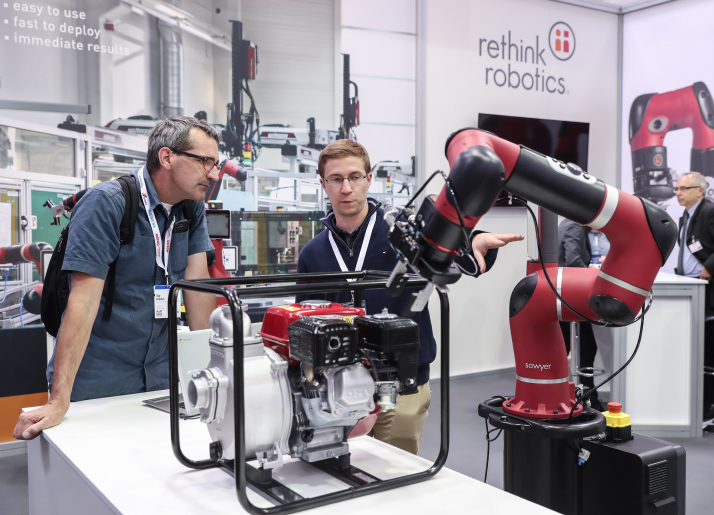| Business |
| AI Seen as Driving Force in Industry 4.0 | |
|
|
 A staff member introduces intelligent robot to a visitor at the Hanover Fair 2018 in Germany on April 23 (XINHUA)
Artificial intelligence (AI) is no longer a vision for the future since technology has already been introduced to consumers in the form of virtual assistants in our smartphones, tablets, speakers and computers. But how does it fit into the Industry 4.0 concept? During the Hanover Fair 2018 held from April 23 to 27 in Germany, IT companies and robotic equipment producers were keen to paint a picture of future factories where AI will play a key role. Two branches of AI—machine learning and deep learning—are seen as having the capability of building on the strength of big data to optimize processes, find new solutions and gain new insights. Machine learning, in particular, enables predictions to be made based on large amounts of data. This branch of AI is built on pattern recognition and has the ability to independently draw knowledge from experience. For this reason, the technology has found its place in industrial processes. "Because AI enables two machines to connect, I can get information from one machine and subsequently, begin to predict an outcome, the quality of a product, maintenance and even logistics processes," said Hans Thalbauer, senior vice president in charge of the Internet of Things and Digital Supply Chain at SAP, a German-based multinational software corporation. "It's really going away from the reactive, alert-driven type of business," Thalbauer added. At the fair, the company showcased a bottling machine that can fill different bottles with different colored liquids instead of just one, something SAP developed with other equipment producers. This is quite different from the conventional manufacturing process, which can only produce a certain type of product one at a time. The sensors on the machine collect and send the data to the computing platform, which can then analyze the process and tell the machines how to handle the individual bottles. Nowadays, every single item on the production line can be individualized, at a cost similar to mass production, said Thalbauer. SAP has also developed smart, automated work assembly stations, which understand the priority of the orders, the availability of required resources, battery life and much more. Using this knowledge, they can independently decide whether it is more efficient to skip an assembly step and perform it later. This means assembly will no longer be linear but flexible, which could mark the beginning of the end of the assembly line. From small and medium-sized companies to large international corporations, every organization can accumulate data that it can put to use. This data is consolidated and evaluated to make predictions with software, and machine learning recognizes characteristics and relationships, using algorithms to make generalizations. However, AI's benefits are yet to be fully recognized by companies in many sectors. AI is supposed to keep Europe's energy suppliers competitive, but only 23 percent of them have an AI implementation strategy, according to a study by Roland Berger, a consulting firm headquartered in Munich. Some 83 percent of the more than 50 interviewed utility companies said they realize that something has to change, and that they assume AI will play an important role in their future business. However, 40 percent acknowledged that they have no conceptual use for the technology, the study showed. Consultants recommended a gradual introduction—utility companies should first use prepared applications to optimize existing systems—and the funds saved could then be used to develop new AI business models. This is an edited excerpt of an article originally published by Xinhua News Agency Copyedited by Rebeca Toledo Comments to zhouxiaoyan@bjreview.com |
|
||||||||||||||||||||||||||||||
|